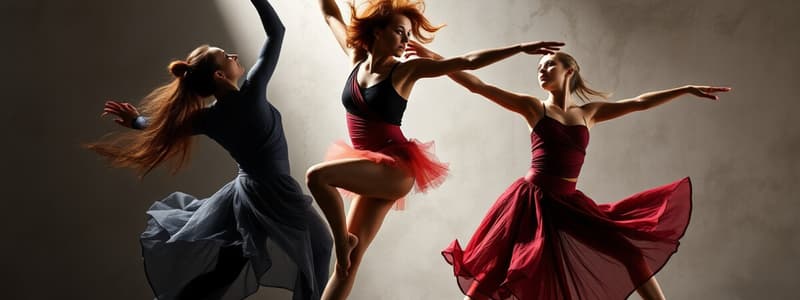Podcast
Questions and Answers
What does the term 'space' refer to in the context of physical education?
What does the term 'space' refer to in the context of physical education?
- The speed at which movements are performed
- The type of relationships performers maintain
- The intensity of a movement's force
- The physical area where movements occur (correct)
Which aspect of dynamics is NOT included in its definition?
Which aspect of dynamics is NOT included in its definition?
- Flow
- Timing
- Force
- Direction (correct)
What contributes to achieving advanced rhythmic movements?
What contributes to achieving advanced rhythmic movements?
- Complex pathways within the performance area
- Coordination and control over movement flow (correct)
- High levels of force during performance
- Engaging multiple performers simultaneously
How does mastering dynamics impact movement quality?
How does mastering dynamics impact movement quality?
What do 'relationships' in compositional elements primarily describe?
What do 'relationships' in compositional elements primarily describe?
What is the primary responsibility of a captain in a sports team?
What is the primary responsibility of a captain in a sports team?
What role does a sweeper play in Gaelic football?
What role does a sweeper play in Gaelic football?
Which of the following is NOT a duty of non-playing roles, such as coaches or officials?
Which of the following is NOT a duty of non-playing roles, such as coaches or officials?
How does effective communication between coaches and captains impact a sports team?
How does effective communication between coaches and captains impact a sports team?
What is a crucial advantage of having strong relationships among teammates?
What is a crucial advantage of having strong relationships among teammates?
In what way do officials contribute significantly to sporting events?
In what way do officials contribute significantly to sporting events?
What challenge can arise from poor relationships with officials?
What challenge can arise from poor relationships with officials?
How does the role of a libero differ from other positions in volleyball?
How does the role of a libero differ from other positions in volleyball?
Flashcards are hidden until you start studying
Study Notes
Compositional Elements in Sports
- Composition arranges planned movements in a designed sequence, essential in aesthetic sports like dance, synchronized diving, and gymnastics.
- Key compositional elements: Space, Dynamics, Rhythm, Relationships.
Space
- "Space" encompasses the physical area for movements: general space and personal space.
- General space includes broad areas like gyms or fields; personal space is the area surrounding an individual for safety and efficiency.
- Movement variations include levels (high, medium, low), directions (forward, backward, sideways), pathways (straight, curved, zigzag), and planes (sagittal, frontal, transverse).
- Effective space use enhances safety, efficiency, and overall performance.
Dynamics
- "Dynamics" refers to the quality and intensity of movements, focusing on force, flow, and timing.
- Force ranges from strong (e.g., high jumps) to light (e.g., tiptoeing).
- Flow can be smooth and continuous or controlled and segmented, impacting movement aesthetics.
- Timing varies from fast (e.g., sprinting) to slow (e.g., stretching).
- Mastering dynamics improves movement quality and expressiveness.
Rhythm
- Rhythm pertains to how movement skills are executed, emphasizing control and coordination.
- Advanced rhythmic movements are smooth, visually appealing, and uninterrupted.
Relationships
- "Relationships" describe interactions among performers, space, objects, and audiences.
- Effective positioning, coordination, and communication are vital for synchronized routines and performances.
- Relationships enhance trust and coordination, essential for seamless performance execution and a cohesive presentation.
Roles and Relationships in Sports
- Various roles in sports contribute to successful performances, including leadership and specialist skills.
Playing Roles
- Leadership roles include captain and vice-captain, responsible for team communication, morale, and decision-making.
- Sport-specific positions and specialist skills, like scrum half or goalkeeper, are vital for team dynamics.
Captain and Vice-Captain
- A captain leads by example, inspiring teammates, and linking coaches and players.
- Their strategic decision-making shapes team success; Katie McCabe is a noted captain of the Irish National Team.
Specialist Roles
- The sweeper, such as Barry Moran, provides defense by intercepting plays in Gaelic football.
- Goalkeeper Mary Earps exemplifies strong goalkeeping, with leadership and shot-stopping abilities.
Non-Playing Roles
- Coaches guide athletes, develop strategies, and enhance skills, influencing team dynamics significantly.
- Officials ensure fair play and maintain order, upholding sports integrity and preventing disputes.
Importance of Relationships
- Strong relationships between captains, coaches, and teammates are crucial for effective communication and teamwork.
- Clear dialogue enables real-time adjustments during games and enhances team morale and unity.
- Respectful communication with officials improves game flow and reduces disputes.
Leadership and Trust
- The coach-captain relationship is built on mutual trust, vital for strategic leadership and execution.
- Respectful interactions with officials foster fairness and sportsmanship, crucial for maintaining integrity.
Player Development
- Supportive relationships among teammates and coaches encourage personal growth and continuous improvement.
- Respect for officials teaches players the importance of fairness and adherence to rules, fostering athlete development.
Studying That Suits You
Use AI to generate personalized quizzes and flashcards to suit your learning preferences.





